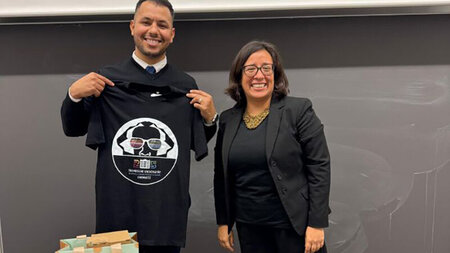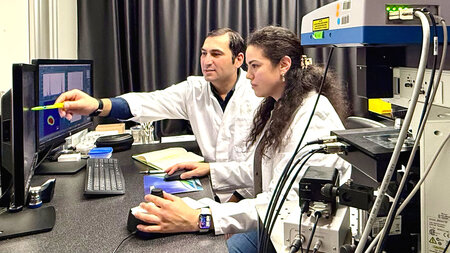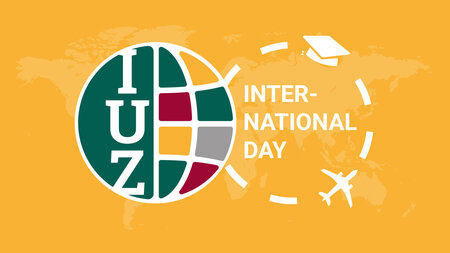Postdoc
The successful completion of a doctorate is a mandatory prerequirement for a scientific career at a university in Germany. Though, thanks to its high public reputation, a doctoral degree is also a component for a succssful professional career in the non-scientific sector which should not be underestimated. As this decision will have considerable influence on the further way of life, it should be well reflected.
Ways of Career
In contrast to the non-scientific sector, the succesful completion of a doctorate is within a scientific career generally "only" considered as an "intermediate step" for further scientific qualification. Thus, f.e. the "Wissenschaftszeitvertragsgesetz" ("Act on Limited Working Contracts in Science") regulates that an employment for a limited period at a university or scientific institution shall serve for the further scientific qualification. In the non-scientific sector, the PhD is more considered as (additional) qualification for specific professional and position profiles.
In general, there is permeability given between the two career paths. For many postdoc positions in the scientific sector, practical experiences are expressively desired or even required. Furthermore, trying out both sectors may also have beneficial influence on the own decision for the one or the other career path according to the individual competencies and tendancies.
A very important aspect in your process of decision-making for the one or the other career path (or also for changing between them) should be that your choice corresponds to your individual skills and abilities as well as to your tendancies and desires for assuring that you feel well and that you are successful in your professional activity.
With regard to a position as scientific staff member at a university, you should pay attention to the fact that you can be employed for a limited period only up to a maximum of 12 years and that for calculating periods of employment prior and after your doctorate will be added up. After expiry of that limit, you either have to take up an employment for an unlimited period of time in the scientific sector or you have to change into the non-scientific sector. An exemption are third-party-funded research projects where you can be employed at any time.
If you decide after your doctorate to continue your professional career in the scientific sector, you have got two general opportunities for qualification: the Habilitation and the Junior-Professorship. Both share the same objective to end in the appointment for a full professorship which is normally assigned for an unlimited period of time. Wheras the Habilitation is the "classical" way, the Junior-Professorship as alternative option was introduced in Germany only in the year 2002.
Habilitation
The same way as regarding a doctorate, also the procedure for a Habilitation is defined by the respective faculties in their Habilitation Regulations (in German). The decision about your application for Habilitation belongs to the Habilitation Commitees at the faculties.
One of the basic formal requirements for the admission to Habilitation is the successful completion of a doctorate. In addition, the Habilitation should generally not follow the doctorate immediately but shall be separated of it by a certain "practical phase" in research and teaching. Frequently, also proofs of already published scientific elaborations are demanded. The detailed requirements can be looked up in the Habilitation Regulations of the faculties (in German).
Similar to a doctorate, also for the initiation of a Habilitation procedure, the elaboration and acceptance of a written scientific work, the Postdoctoral Thesis ("Habilitationsschrift"), counts among the indispensable preconditions whereas the requirements regarding formalities and content are much higher. Furthermore, after the acceptance of the Postdoctoral Thesis, also scientific performances, test lectures and colloquia have to be absolved. You can look up the details in the respective Habilitation Regulations of the faculties.
In case that all required partial deliveries were performed and recognised by the Habilitation Commitee of the faculty, the Habilitation is completed. By the Habilitation, you will be awarded the authorization to teach at a university. Depending on the respective Habilitation Regulation, your PhD can be complemented by the supplement "PD" or "habil." At that point, you have proven your special aptitude for research and independant teaching on one of the scientific areas represented by the awarding faculty. Thus, you fulfill the basic requirements for applying for appointment on a full professorship at a German university.
Junior-Professorship
There are several characteristics distinguishing a Junior-Professorship from a Habilitation:
- The first is historical: Whereas the Habilitation represents the "classical" qualification for being entitled to apply for a full professorship, the Junior Professorship as alternative option exists in Germany only since 2002.
- Another difference is the focus: Wheras the Habilitation is concentrated on the written scientific work (Postdoctoral Thesis), the Junior-Professorship aims at preparing in a practice- and application-oriented way for the future professional activity as full professor in research and teaching.
- And finally, the Junior-Professorship sometimes includes the option of a "tenure track", which means the transition in a full professorship after positive assessment of the deliveries performed during the phase of the Junior-Professorship.
The requirements for employment and appointment of Junior-Professors are regulated for universities in the Free State of Saxony in § 63 Sächsisches Hochschulfreiheitsgesetz (Act on the Freedom of Universities in the Free State of Saxony). This requires from candidates proofs of successfully completed university studies, of respective pedagogical competencies as well of special aptitude for scientific work which is generally proven by the outstanding quality of a doctoral degree.
If you are interested in a Junior-Professorship at Chemnitz University of Technology, please look first in the open job positions if there is a call for applications for a position according to your subject and qualifications. You find further details (i.a. special preconditions, required proofs and qualifications, application deadlines and contact data for submission of applications documents) when clicking on the hyperlink of the respective call. Please be aware that the calls are only provided in German language. In case of linguistic comprehension challenges, make use of a translation tool, e.g. Google-Translate.
Also this is regulated in the Sächsisches Hochschulfreiheitsgesetz (Act on the Freedom of Universities in the Free State of Saxony) (§§ 64,70): After successful application, you will be employed and appointed by the President of Chemnitz University of Technology as Junior-Professor for a period of initially four years. A prolongation of the employment up to a total of six years depends on the result of an assessment of the delivieries you have performed in research and teaching during that period: In case of positive result, your qualification is considered as equal to the Habilitation so that you are as well entitled to apply for a full professorship.
Full Professorship
The Full Professorship is not anymore a position for scientific qualification which means that it is in general awarded for an unlimited period. Furthermore, only a candidate qualified by a Habilitation or a Junior-Professorship is entitled to become a holder of a Full Professorship with the corresponding full competencies. An exemption are the Extraordinary Professorships which may also being awarded to persons with other qualifications.
Open or additional full professor positions are published in the open job positions of Chemnitz University of Technology. An Appointment Committee established for the respective appointment procedure at the responsible faculty elaborates a proposition for appointment based on the assessment of the applications submitted which subsequently has to be approved by the Board of the Faculty. The decision on the appointment belongs then to the President in coordination with the faculty. In the case that the appointment negotiations are accomplished successfully, the candidate will finally be appointed as full professor by the President.
The whole procedure is regulated within the Appointment Regulations of Chemnitz University of Technology (in German) which is in turn based on the respective specifications of the Sächsisches Hochschulfreiheitsgesetz (Act on the Freedom of Universities in the Free State of Saxony) (§ 60).
Offers for support
With regard to academic questions in preparation and during your qualification phase, your academic supervisor at the faculty is your first contact person who is responsible for the academic support of your research project (e.g. Habilitation).
When you have organizational questions, the International Office of Chemnitz University of Technology is also at your disposition as postdoc. With its PhD-Assistants, it offers a special service for international PhD-students and postdocs at Chemnitz University of Technology: They can f.e. being "booked" for accompanying to authorities by their contact address. Additionally, they organize a variety of networking events for international PhD-students, postdocs and (guest-)researchers. If you would like to be kept on the run about those (and other) offers, please simply register at the mailing list of the PhD-Assistants.
The most common opportunity for financing the phase of scientific qualification is the employment as scientific staff member. If you are interested in that option, you are welcome to apply for an open job position of Chemnitz University of Technology on your subject field. In case of successful application, please also pay attention to our information regarding employment of scientists from abroad. Junior-Professors and Professors receive a salary with their position.
In addition, there is a great number of organisations and foundations which are funding within a variety of programs stays of international PhD-students and postdocs at German universities. You find an overview in the category "Funding opportunities".
The International Office offers in cooperation with the Center for Foreign Languages regularly German Language Training Courses for international PhD-students and postdocs. You will receive current information (incl. documents for registration) by registering within the mailing list of the PhD-Assistants. Furthermore, you may take part in training courses also in other languages at the Center for Foreign Languages.
The Center for Young Scientists of Chemnitz University of Technology offers regularly a variety of workshops regarding generic competencies and qualifications, i.a. writing and presentation skills, effective teamwork or target-oriented elaboration of applications for third-party-funding. In addition, also the International Office organizes some workhops, particularly regarding intercultural topics. You will receive current information about these (and other) offers by registering within the mailing list of the PhD-Assistants of the International Office.
When you have general questions or ideas/ issues regarding the promotion of young scientists at Chemnitz University of Technology in general, you are welcome to address to the Commissioner of the University Management for Junior Researchers at Chemnitz University of Technology.





